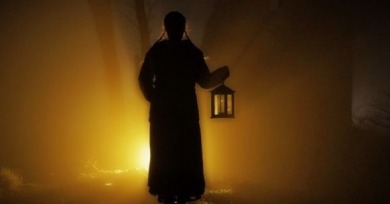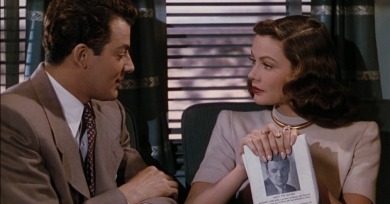Michael Koresky
Linklater, ever the good-natured observer of human connection and sensitive American masculinity, creates something strangely beautiful. He sculpts decency from what might have otherwise seemed an undifferentiated mass of testosterone.
This is a film of unspeakable emotions, not platitudes; of how life and death can instill a room with meaning, not the lessons we learn from pain and loss.
The miracle of the cinema of Apichatpong Weerasethakul—certainly among our greatest living filmmakers—is that he has used film to allow us to see through his eyes: maybe the highest compliment one can pay to a maker of moving images.
It’s like a cautionary bedtime story told to seventeenth-century American tots by cruel parents tucking them in at night as the wind howls outside the door.
The main characters move inexorably, helplessly toward disillusionment and alienation even as they seem to be always standing in more or less the same spot: at the edge of a precipice.
The camera is weapon and savior, mediator and patient observer, but it is never objective in Cameraperson, an extraordinary and singular filmmaking document by Kirsten Johnson that quietly lorded over everything I saw at the 2016 Sundance Film Festival.
Chi-Raq is a testament to the power of words. And in a film that mostly shies away from depicting bloody violence onscreen, that’s quite a statement.
Those of us already feeling nostalgic for print, and for whom deep investigative journalism seems like a dying art in an era when crossing t’s and dotting i’s seems to be of less and less priority, will come to Spotlight with a sympathetic eye.
A Few Great Pumpkins
The Witch, The Hound of the Baskervilles, In the Mouth of Madness/Hair, Ringu, The Visit, Nosferatu the Vampyre, Carrie
Halloween is our most cinematic holiday; for a few hours in the dark, it turns our everyday world into a surreal, upside-down place. In this short film we go trick or treating with some of the Halloweens that have haunted our collective movie dreams.
Rohrwacher doesn’t seem interested in telling us what we should be thinking; rather she lets us accompany these people from one task to the next. There’s no fetishizing or romanticizing of work or youth, just a matter-of-fact, if narratively furtive, take on communal living and familial interaction.
For this author, taking any portion of the artistic onus off of Minnelli is not an easy or natural task, but hopefully a compelling and revealing one that will help me rethink my long-held beliefs and biases.
We decided to embark on this symposium as a way of acknowledging film as a collaborative medium, yes, but also to underline how precarious our conception of film as an “authored” form really is.
One of the miracles of cinema is that genuine artists can use the medium to convey otherwise inexpressible, even intangible emotions, using image and sound to create emotional landscapes that in writing might be too explicit or in music too oblique.
Hou’s latest, The Assassin, his first in the wuxia genre, is perhaps his most senses-heightening work yet, a film of simultaneous action and repose, of specificity and abstraction, giving the viewer just enough information to follow its dense narrative avenues while asking that their eyes take the road less traveled.
Taxi interrogates itself—as cinema, as document, and, because of Panahi’s particular political reality, as an expression of artistic freedom. Panahi has taken to a purposeful extreme the notion that strictures and limitations are beneficial to the creation of art.
An air of cool sophistication can hardly conceal the true geek-show nature of Veronika Franz and Severin Fiala’s Goodnight Mommy.
The ghosts of summers past haunt 2015 in this action-packed, star-studded new Reverse Shot Movie by Jeff Reichert and Michael Koresky.
Phoenix is a gorgeously odd film, a quietly symphonic elegy fueled by a magnificently preposterous plot that ends up as something like a cross between Roberto Rossellini’s Stromboli and Hitchcock’s Vertigo—but communicated through the specific experience of Jewish-German identity.
Woody Allen’s latest, Irrational Man, is, whether one accepts or rejects its brutal fatalism, a totalizing aesthetic experience that provides evidence that this seventy-nine-year-old is a craftsman we should still be paying attention to.



















